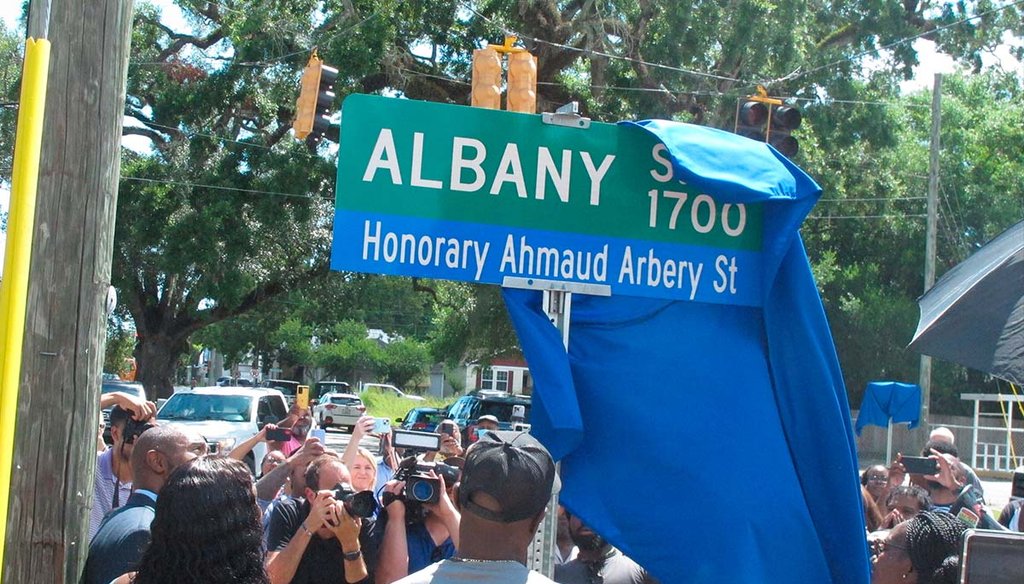

Our only agenda is to publish the truth so you can be an informed participant in democracy.
We need your help.


A new street sign marking Honorary Ahmaud Arbery Street is shown Aug. 9, 2022, in Brunswick, Ga. (AP)
• Law enforcement agency participation in the FBI’s hate crime data collection is well short of 100%. Even after allowing additional time for law enforcement agencies to comply, just more than one-fifth of agencies nationwide failed to send hate crime data to the FBI.
Sen. Kirsten Gillibrand, D-N.Y., recently expressed concern about hate crimes — not just that they’re committed, but that law enforcement agencies aren’t counting them and submitting their totals to the federal government.
In a March 20 visit to John Jay College of Criminal Justice in New York City, Gillibrand joined Rep. Grace Meng, also D-N.Y., to encourage reporting of hate crimes nationally.
"We were alarmed to find out that many law enforcement agencies didn’t submit their data to the FBI at all," Gillibrand said. "We must make sure that we have the most updated and accurate hate crime data so we can fully understand the problem and identify real solutions."
Gillibrand said that less-than-complete reporting to the FBI’s National Incident-Based Reporting System could produce a false sense of security that the number of hate crimes is declining.
"While we commend the steps local law enforcement and the Department of Justice have taken in responding to such incidents, reporting, collecting and maintaining the most accurate data available is crucial in evaluating and responding to hate-related crimes as well as keeping our neighborhoods safe from such reprehensible attacks," Gillibrand wrote in a letter to the Justice Department that Meng, four other House Democrats, and one House Republican co-signed.
Is Gillibrand right that "many law enforcement agencies didn’t submit their (hate crime) data to the FBI"?
Although "many" is a tricky word to define, the acknowledged reporting deficiencies suggest that the description is reasonable.
When the FBI released its 2021 Hate Crimes Statistics Report in December 2022, it cautioned that the report’s numbers were incomplete, drawn from data received from 11,834 law enforcement agencies. These agencies account for 63% of the 18,812 law enforcement agencies in the U.S., covering 64.8% of the population.
The rate of coverage increased as the FBI received late-arriving data. By the time the FBI published updated data in March 2023, it included an additional 3,025 law enforcement agencies, bringing the total to 14,859 agencies.This increased the FBI’s data coverage to 79% of law enforcement agencies and a bit more than 91% of the population.
But almost 4,000 agencies were left out.
"Anywhere from one-tenth to one-fifth of the hate crime data is still missing," said Evan Lukaske, Gillibrand’s communications director.
Brian Levin, a criminal justice professor at California State University-San Bernardino and director of its Center for the Study of Hate & Extremism, said Gillibrand’s concerns are well-founded.
Many large cities in recent years have reported zero hate crime or didn't participate, including Miami; Tucson, Arizona; Anaheim, California; Newark, New Jersey; and Des Moines, Iowa, Levin said.
The FBI attributes some of the reporting gaps to its transition to the National Incident-Based Reporting System in 2021, which allows greater statistical specificity about individual incidents than the previous tool, the Summary Reporting System.
In her letter to the Justice Department, Gillibrand requested an overview of the department's current state and expectations.
"Keeping up-to-date data for these incidents is imperative for law enforcement agencies to be able to do the work needed to combat hate crimes," she wrote.
Gillibrand said, "Many law enforcement agencies didn’t submit their (hate crime) data to the FBI."
Law enforcement agency participation in the FBI’s hate crime data collection is well short of 100%. Even after allowing additional time for law enforcement agencies to comply, a bit more than one-fifth of agencies nationwide, or nearly 4,000, failed to send hate crime data to the FBI.
We rate the statement True.
AMNY, "Feds must address rise in underreported hate crimes in America, Meng and Gillibrand say," March 22, 2023
Kirsten Gillibrand, "Senator Gillibrand, Representative Meng & Advocates Lead Call For Action To Address The Underreporting Of Hate Crimes," March 20, 2023
Kirsten Gillibrand et al, letter to Justice Department, March 20, 2023
Justice Department, "FBI Releases 2021 Hate Crime Statistics," December, 2022
FBI, "FBI Releases Supplemental 2021 Hate Crime Statistics," March 13, 2023
Email interview with Brian Levin, professor of criminal justice and director of the Center for the Study of Hate & Extremism at California State University-San Bernardino, April 11, 2023
Email Interview with Evan Lukaske, communications director for Kristen Gillibrand, April 12, 2023
In a world of wild talk and fake news, help us stand up for the facts.
